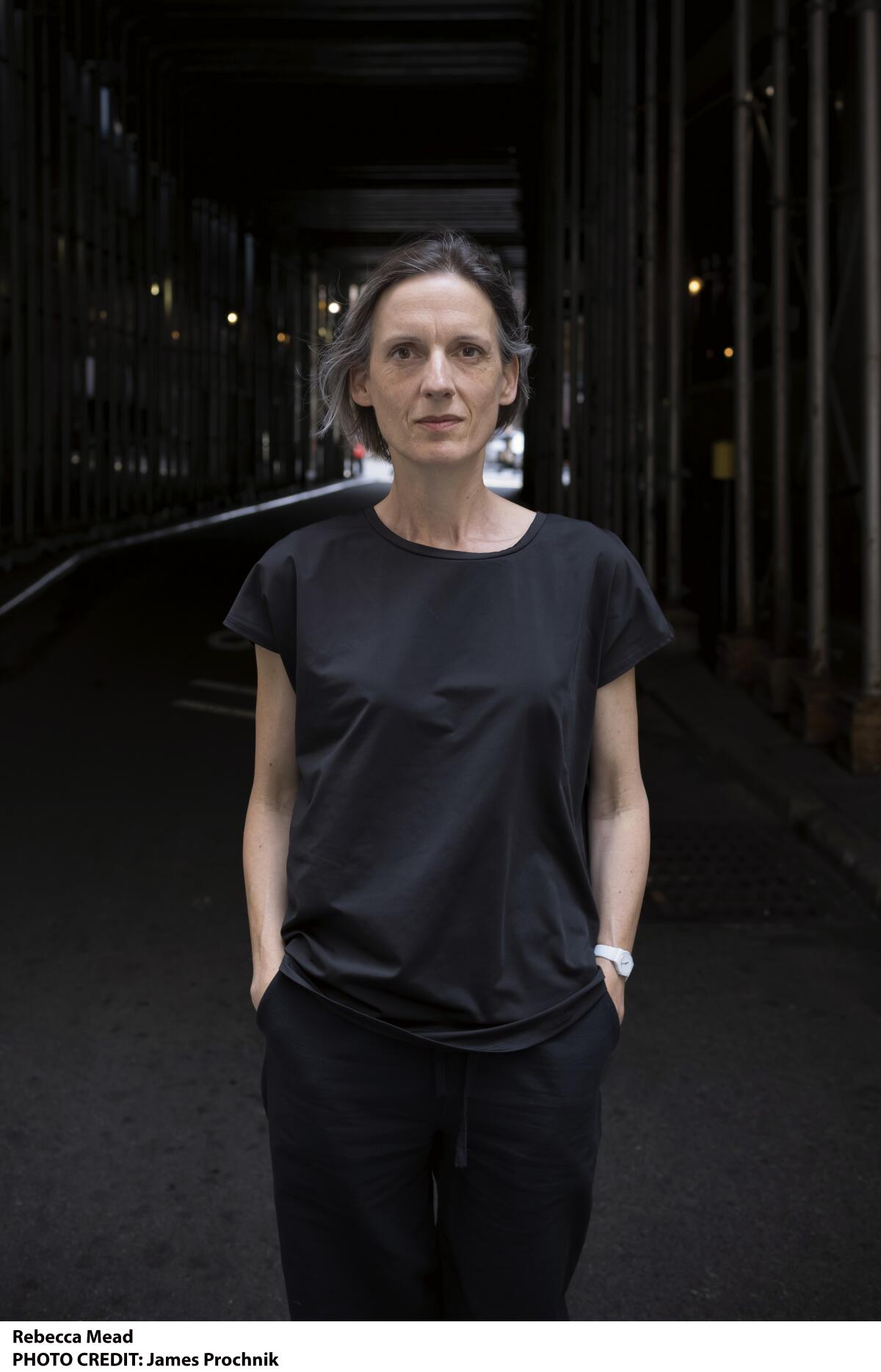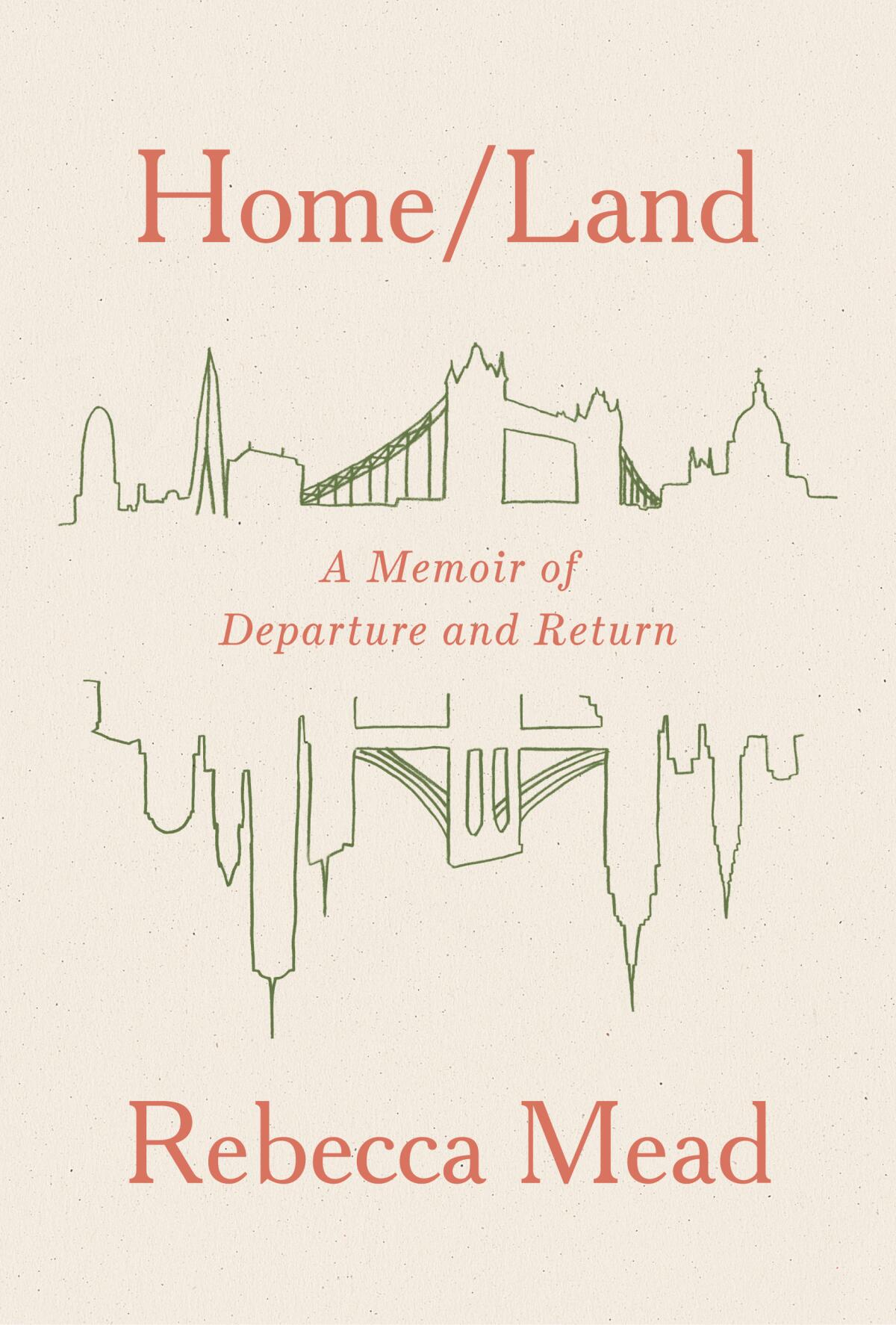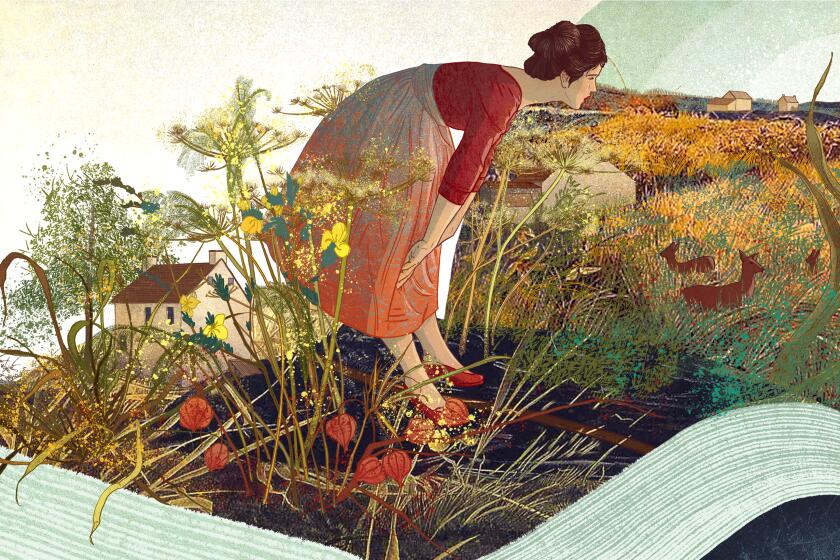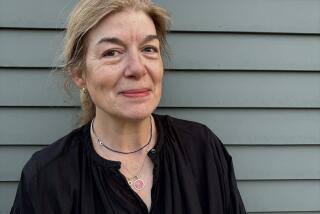For expats during COVID, what does home even mean? A new memoir sheds light

- Share via
On the Shelf
'Home/Land'
By Rebecca Mead
Knopf: 240 pages, $27
If you buy books linked on our site, The Times may earn a commission from Bookshop.org, whose fees support independent bookstores.
In December, I went back to England for the first time in two years. COVID-19 travel restrictions had grounded many people since March 2020, and had I gone “home” to the U.K., I couldn’t easily, as a nonpermanent resident, return “home” to New York. After enduring so much gloomy transatlantic paralysis, I found Rebecca Mead’s new memoir, “Home/Land,” about the metaphysics of repatriation, a timely and powerful read. I suspect I won’t be the only one: This far beyond the looking glass, does anyone feel like they know their way home?
After the 2016 election, Mead, a British expat in New York, experienced a prescient feeling of dread: Some “future crisis” might “cause America to close its doors to noncitizens,” stranding her in England and separating her from her American family. While she overcame this fear by becoming an American citizen and returning to the U.K., it had stoked one of the most soul-taxing questions of moving away. Where do we really belong?
Although born in London, Mead grew up in Weymouth, “a scruffy resort where the smell of frying fish-and-chip batter fills your nostrils as soon as you get off the train.” In her early 20s — armed with a student visa, a new Walkman and an English accent — she decamped to New York City, where, over the next three decades, she wrote for New York magazine and the New Yorker, moved to Brooklyn, married and had a son. By midlife, she’d lived longer overseas than she had at home.
The third installment of the United We Read series explores stories from Maryland to Oklahoma in advance of the 2020 election.
Mead’s early American life, as revisited in flashback, is thrilling. She interviews Lou Reed and goes to Shaquille O’Neal’s 30th birthday party. She remembers the twin towers, “an exorbitant challenge in defiance of expectations.” She recalls walking “past the derelict piers that still served then as gay cruising grounds, up to the meatpacking district, where sex workers in impossibly high heels stalked cobblestone streets that stank of blood.” Though not exactly nostalgic for grimier times, she eventually finds she’s become an old-timer, no longer delighted by change. The condo creep visible from her Brooklyn home is, in her analogy, like Birnam Wood coming to Dunsinane.
By late 2016, the seeming permanence of her move is threatened by apocalyptic presentiments unleashed by election anxiety. But Mead’s desire to move is not purely an urge to flee the (unnamed) president. After her father’s death, she wants to be closer to her mother. She wants to pass on to her son the pleasures of dual nationality. As much as anything, she fears regretting that “having at one time had the drive to launch myself into the unknown, I had never been sufficiently brave to try it again.”

Mead’s return to England stirs up feelings about impermanence and mortality. She finds its landscape, both social and physical, transformed. Every place she goes is a palimpsest; everywhere she looks, ghosts. Buildings from her past razed, trees long gone. People speak differently, her son picking up so-called “Multicultural London English” rather than the “Cockney vowels and glottal stops” of her father’s generation. The uncanny sensation of returning to a familiar place made strange — both home and not — fires her philosophical imagination.
In this “new, old territory of London,” she becomes preoccupied with the lives and deaths of her ancestors — proof, her husband jokes, that she’s truly become an American. City streets disinter memories. On a visit to the site of a London cemetery that was dug up to make way for a railway line, she finds “bones and skulls intermixing in the heavy clay soil.”
Fiona Mozley, nominated for a Booker Prize for “Elmet,” follows up with “Hot Stew,” the neo-Dickensian tale of a real estate battle in London’s Soho.
Clay: the “slippery, shifting foundation” that, as she discovers, explains why London mortar and pavements crack. In this geological phenomenon, she sees a metaphor for another kind of tectonic shift “in both the country I left and the one to which I returned. ... Foundations that once seemed solid were giving way, and structures that seemed secure were revealed to be vulnerable to collapse.”
Though she’s writing about epochal fractures — Trumpism, Brexit — she is also referring to changes within. Time and distance make things newly legible: the character of your homeland, the mystery of your parents, the pattern of the decades. Life is short, as she’s reminded by the many early, sometimes brutal deaths of her ancestors. “Fifty years is nothing,” an older friend tells her after hearing how Mead’s father still cried at the thought of his own father’s death from tuberculosis.
“Home/Land” certainly has a memento mori quality, but it’s not depressing. In embracing the complexities and paradoxes of home and belonging, Mead also finds solace, even joy. She captures brilliantly the bittersweetness of being far from home, a way of life whose sacrifices are outweighed by a feeling of living deliberately. Perhaps it was only when moving home came to feel as dynamic as moving away once had that she felt inspired to reverse course. Either way, she sees “displacement” as a fulfilling kind of existence, “so constitutional to my own being that I seem to have been compelled to make it my son’s inheritance. I have given him this questionable gift: a lost place to long for.”
That gift — of feeling at home as a foreigner, foreign when you’re at home — is a duality perhaps especially helpful to writers, to whom it lends the kind of stereoscopic perspective that makes Mead’s writing so clear and profound. Even for those who stay put, which is to say most of us for the last two years, “Home/Land” is a remarkable exploration of how being mindful of the past can enrich and imbue with urgency our everyday lives. Our past, Mead reveals, is the home we take with us.
Ayad Akhtar, author of the new novel, “Homeland Elegies,” talks capitalism, Trump and literary tokenism with “Conditional Citizens” author Laila Lalami.
Arrowsmith is based in New York and writes about books, films and music.
More to Read
Sign up for our Book Club newsletter
Get the latest news, events and more from the Los Angeles Times Book Club, and help us get L.A. reading and talking.
You may occasionally receive promotional content from the Los Angeles Times.









